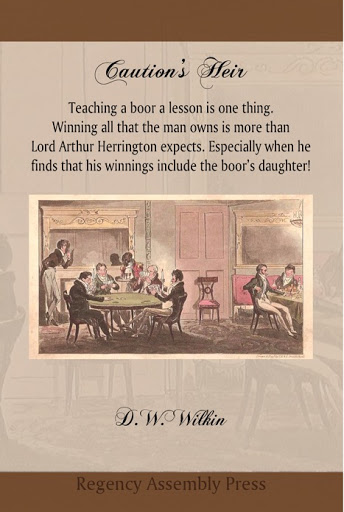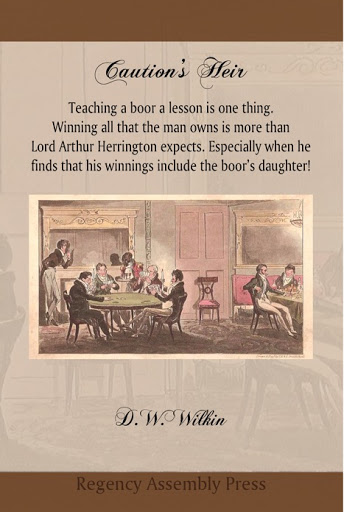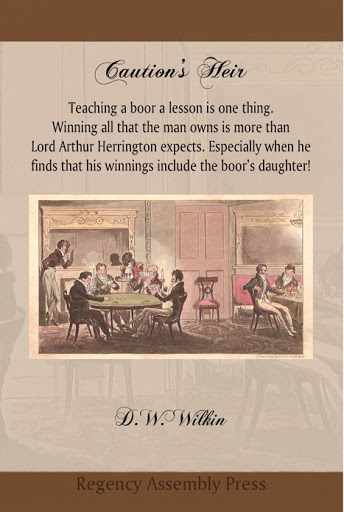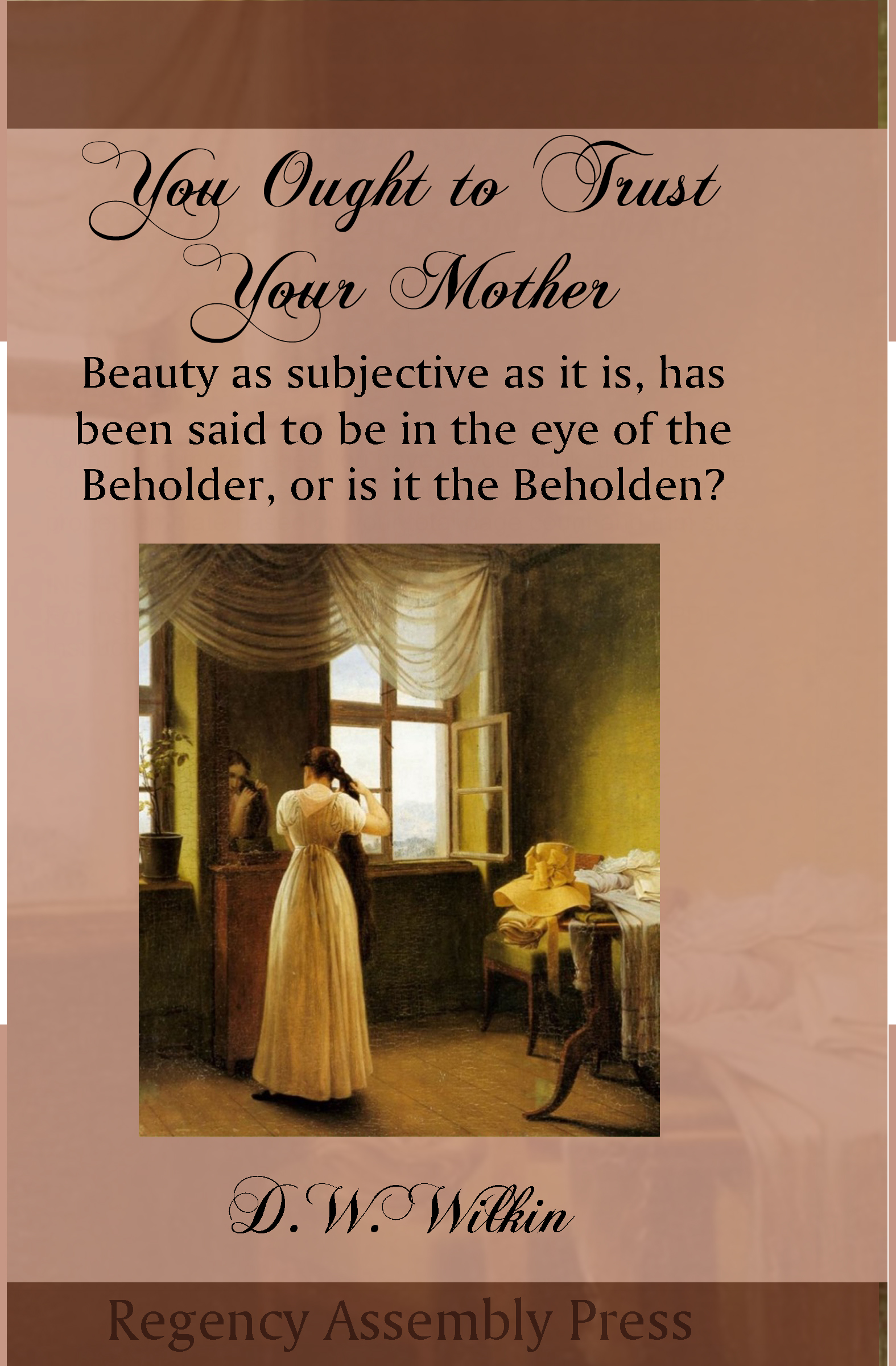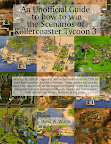Caution’s Heir is now available at all our internet retailers and also in physical form as well
The Trade Paperback version is now available for purchase here @ $15.99 (but as of this writing, it looks like Amazon has still discounted it 10%)
Caution’s Heir is also available digitally for $4.99 @ the iBookstore, Amazon, Barnes and Noble, Kobo and Smashwords.
The image for the cover is a Cruikshank, A Game of Whist; Tom & Jerry among the ‘Swell Broad Coves.’ Tom and Jerry was a very popular series of stories at the time.
Teaching a boor a lesson is one thing.
Winning all that the man owns is more than Lord Arthur Herrington expects. Especially when he finds that his winnings include the boor’s daughter!
The Duke of Northampshire spent fortunes in his youth. The reality of which his son, Arthur the Earl of Daventry, learns all too well when sent off to school with nothing in his pocket. Learning to fill that pocket leads him on a road to frugality and his becoming a sober man of Town. A sober but very much respected member of the Ton.
Lady Louisa Booth did not have much hope for her father, known in the country for his profligate ways. Yet when the man inherited her gallant uncle’s title and wealth, she hoped he would reform. Alas, that was not to be the case.
When she learned everything was lost, including her beloved home, she made it her purpose to ensure that Lord Arthur was not indifferent to her plight. An unmarried young woman cast adrift in society without a protector. A role that Arthur never thought to be cast as. A role he had little idea if he could rise to such occasion. Yet would Louisa find Arthur to be that one true benefactor? Would Arthur make this obligation something more? Would a game of chance lead to love?
Today, the iBookstore is added, HERE
Get for your Kindle, Here
In Trade Paperback, Here
Digitally from Smashwords, Here
For your Sony Kobo, Here
Or for your Nook, Here
From our tale:
Chapter One
St. Oswald’s church was bleak, yet beautiful all in one breath. 13th century arches that soared a tad more than twenty feet above the nave provided a sense of grandeur, permanence and gravitas. These prevailed within, while the turret-topped tower without, once visible for miles around now vied with mature trees to gain the eye of passers-by.
On sunny days stain-glass windows, paid for by a Plantagenet Baron who lived four hundred years before and now only remembered because of this gift, cast charming rainbow beams across the inner sanctum. And on grey overcast days ghostly shadows danced along the aisle.
As per the custom of parish churches the first three pews were set-aside for the gentry. On this day the second pew, behind the seat reserved for the Marquess of Hroek, who hadn’t attended since the passing of his son and heir, was Louisa Booth his niece and her companion Mrs Bottomworth.
Mrs Bottomworth was a stocky matron on the good side of fifty. Barely on the good side of fifty. But one would not say that was an unfortunate thing for she wore her years well and kept her charge free of trouble. Mrs Bottomworth’s charge was an only child, who would still have been in the schoolroom excepting the fact of the death of her mother some years earlier. This had aged the girl quickly, and made her hostess to her father’s household. The Honourable Hector Booth, third son of the previous Marquess, maintained a modest house on his income of 300 pounds. That was quite a nice sum for just the man and one daughter, with but five servants. They lived in a small, two floor house with four rooms. It should be noted that this of course left two bedchambers that were not inhabited by family members. As the Honourable Mr Booth saved his excess pounds for certain small vices that confined themselves with drink and the occasional wager on a horse, these two rooms were seldom opened.
Mrs Bottomworth had thought to make use of one of the empty rooms when she took up her position, but the Honourable Hector Booth advised and instructed her to share his daughter’s room. For the last four years this is what she had done. When two such as these shared a room, it was natural that they would either become best of friends, or resent each other entirely. Happily the former occurred as Louisa was in need of a confidant to fill the void left in her mother’s absence, and Mrs Bottomworth had a similar void as her two daughters had grown and gone on to make their own lives.
The Honourable Mr Booth took little effort in concerning himself with such matters as he was ever about his brother’s house, or ensconced in a comfortable seat at either the local tavern or the Inn. If those locations had felt he was too warm for them, he would make a circuit of what friends and acquaintances he had in the county. The Honourable Mr Booth would spend an hour or two with a neighbour discussing dogs or hunters, neither of which he could afford to keep, though he did borrow a fine mount of his brother to ride to the hunt. The Marquess took little notice, having reduced his view of the world by degrees when first his beloved younger brother who was of an age between the surviving Honourable Mr Booth had perished shortly after the Marquess’ marriage. Their brother had fallen in the tropics of a fever. Then the Marquess had lost his second child, a little girl in her infancy, his wife but a few years after, and most recently his son and heir to the wars with Napoleon.
This caused the Honourable Mr Booth to be heir to Hroek, a situation that had occurred after he had lost his own wife. With that tragedy, Mr Booth had found more time to make friends with all sorts of new bottles, though not to a degree that it was considered remarkable beyond a polite word. Mr Booth was not a drunkard. He was confronting his grief with a sociability that was acceptable in the county.
Louisa, however, was cast further adrift. No father to turn to. No uncle who had been the patriarch of the family her entire life. And certainly now no feminine examples to follow but her companion and governess, Mrs Bottomworth. That Mrs Bottomworth was an excellent choice for the task was more due to acts of the Marquess, still able to think clearly at the time she was employed, than to the Honourable Mr Booth. Mr Booth was amenable to any suggestion of his elder brother for that man controlled his purse, and as Mr Booth was consumed with grief, while the Marquess had adapted to various causes of grief prior to the final straw of his heir’s death, the Marquess of Hroek clearly saw a solution to what was a problem.
Now in her pew, where once as a young girl she had been surrounded by her cousins, parents, uncles and aunt, she sat alone except for her best of friends. Louisa was full of life in her pew, her cheeks a shade of pink that contrasted with auburn hair, which glistened as sunlight that flowed though the coloured panes of glass touched it from beneath her bonnet. Blue eyes shown over a small straight nose, her teeth were straight, though two incisors were ever so slightly bigger than one would attribute to a gallery beauty painted by Sir Thomas Lawrence.
She was four inches taller than five feet, so rather tall for a young woman, but her genes bred true, and many a girl of the aristocracy was slightly taller than those women who were of humbler origins. Her back was straight and for an observant man, of which there were some few in the county, her figure might be discussed. The wrath though of her uncle the Marquess would not wish to be bourne should it be found out that her form had become a topic amongst the young men. Noteworthy though was that she had a figure that men thought inspiring enough to tempt that wrath, and think on it. A full bosom was high on her chest, below her heart shaped face. She was lean of form, though her hips flared just enough that one could see definition in her torso. Certainly a beauty Sir Thomas’ brushes would wish the honour to meet.
The vicar Mr Spotslet had at one time in his early days in the community, discussed the Sunday sermons with the Marquess. Mr Spotslet had enjoyed long discussions of theology, philosophy, natural history and the holy writ that were then thoughtfully couched in terms to be made accessible by the parish. The lassitude that had overtaken the Marquess had caused those interviews to become shortened and infrequent and as such the sermons suffered, as many were wont to note. There had been dialogues that Mr Spotslet had engaged in with the attendees of his masses. Now he seemed to have lost his way and delivered soliloquies.
This day Mr Spotslet indulged in a speech that talked to the vices of gambling. The local sports, of which the Honourable Mr Booth was an intimate, had raced their best through the village green the previous Wednesday for but a prize of one quid, and this small bet had caused pandemonium when Mrs McCaster had fallen in the street with her washing spread everywhere and trampled by the horses. Not much further along the path, Mr Smith the grocer’s delivery for the vicar himself was dropped by the boy and turned into detritus as that too was stampeded over. A natural choice for a sermon, yet only two of the culprits were in attendance this day. The rest had managed to find reasons to avoid the Mass.
Louisa squirmed a little in her seat the moment she realised that her father had been one of the men that the sermon was speaking of. Was she not the centre of everyone’s gaze at such a time? Her father having refused to attend for some years, and her uncle unable due to his illness. She was the representative of the much reduced family. Not only was it expected that the parish would look to her as the Booth of Hroek, but with her father’s actions called to the attentions of all, it was natural that they look at her again. This time in a light that did not reflect well on her father and she knew that she had no control over that at all.
Mrs Bottomworth, who might have been lightly resting her eyes, Louisa would credit her in such a generous way, came to tensing at the mention of the incident. Louisa did not want to bring her friend to full wakefulness, but Mrs Bottomworth realised what was occurring and the direction that the sermon was taking. Louisa’s companion took her hand and patted it reassuringly.
“Perhaps a social call on Lady Walker?” Mrs Bottomworth suggested as they walked back to the house after services. The house which sat just within the estate boundaries was four hundred feet off the main bridal way that led to Hroek Castle. A small road had been cleared from the gatehouse to the house that Mr Booth now maintained, and this the two women travelled.
Louisa generally appreciated visits such as this as she had gotten older, and certainly several of the adults in the neighbourhood showed a kindly interest in her education and the development of her social manners. “I think I shall go to the castle and read to my uncle.” A task that she had done each day of the last fortnight but one.
“We have not talked, but you and the Marquess had an interview with the doctors.” Mrs Bottomworth had tried to comfort her charge after that, but Louisa had waved her hand and gone to sit quietly under a yew tree that had a grand vista of the park leading to Hroek Castle.
“Uncle will be most lucky if he should be with us come Michaelmas.”
“That will be a sad day when we lose such a friend.” These were words of comfort. Mrs Bottomworth had been well encouraged in her charge by the Marquess but one could not say that they interacted greatly with one another. The Marquess ensured that his brother heeded the suggestions and advisements of Mrs Bottomworth as the Honourable Mr Booth left to his own devices would have kept his daughter in the nursery and would have forgotten to send a governess to provide her with instruction.
“Indeed, my uncle may not have been one of the great men of England, but he is well regarded in the county.” Often with that statement followed the next, “Warmly remembered is it when the Prince Regent came and stayed for a fortnight of sport and entertainment.” This had been many years before, and certainly before any of the tragedies beset the line of the Booths.
“Yes, I have heard it said with great earnestness. But come let us change your clothes and then we shall go up to the great house. I shall have Mallow fetch the gig so we may proceed all the more expeditiously.”
“That would be good, but we will have to use the dogcart. Father was to take the gig to see Sir Mark today, or so he said at breakfast.” Where Louisa knew he would drink the Baronet’s sherry for a couple hours before thinking to return, unless he was asked to stay for dinner.





